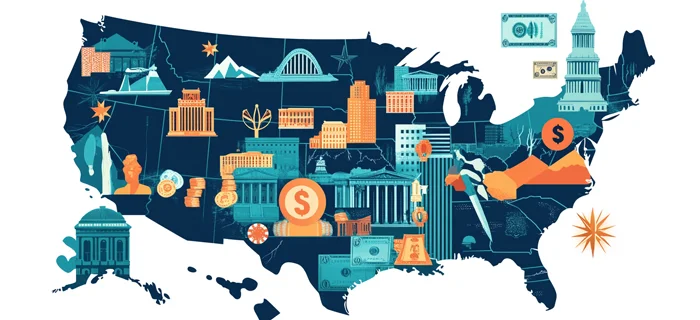When you think about gambling tourism in the USA, it's fascinating to see how each state's laws play a role in shaping the experience for visitors like you. The federal government has set some rules, such as the Wire Act of 1961 and the Unlawful Internet Gambling Enforcement Act of 2006, to govern gambling.
But states like to do things their way. When the Professional and Amateur Sports Protection Act was revoked in 2018, everything changed. It allowed the states to legalise sports betting and expand gambling offerings.
Table of contents
States with restricted gambling laws
Gambling in the USA is a complex landscape, shaped by individual state regulations. Whilst the federal government has set some ground rules, it's the states that ultimately decide how much gambling is allowed. This means that your gambling options can vary greatly depending on where you go.
In states like Hawaii or Utah, where gambling is a big no-no, there are some of the strictest gambling laws in the country. Residents often hop across state lines to Nevada for some casino fun.
It's a great example of strict laws pushing people to seek out more lenient options.
Other states, like Alabama and California, have restrictions on gambling activities. Whilst you might not find a bustling casino scene, you can still enjoy tribal gaming or charitable games.
If you're in California, keep in mind that online gambling is strictly limited. Whilst California online casinos and sports betting aren't officially allowed, punters still find their way to offshore sites for some gaming fun.
Aneeca Younas from Sports Casting says that these casinos are not regulated by the California Gambling Control Commission (CGCC) but are overseen and licensed by regulatory bodies like the Malta Gaming Authority.
Californians are free to play blackjack, poker, and more with no legal recourse.
States with liberal gambling laws
For those who crave the thrill of the casino, Nevada and New Jersey are your go-to destinations. Nevada, especially Las Vegas, is the undisputed king of gambling tourism.
It attracts millions of visitors each year—in fact, in 2019, Las Vegas alone welcomed 42 million tourists, with the gambling sector raking in about $11.9 billion in revenue. This surge in visitors not only benefits the casino industry but also stimulates local businesses like hotels, restaurants, and entertainment spots.
New Jersey is another popular choice, as online casinos are legal in the state, with Atlantic City offering a variety of casinos and a vibrant atmosphere.
The state legalised casino gambling back in 1978 and has since become a major player in the sector, generating around $510.9 million in gaming revenue by April 2024.
In recent years, New Jersey has also expanded its online gambling offerings, attracting tech-savvy travellers from around the world. These states welcome gamblers with open arms and have seen a huge boost in tourism thanks to their relaxed laws. Nevada's Las Vegas is a mecca for casino lovers, drawing millions of visitors yearly and pumping billions into the local economy.
Tribal casino tourism
Let’s talk about tribal casinos—they have become a significant part of the gambling tourism landscape as well as cultural heritage representation. These casinos often offer a unique combination of gaming, dining, and entertainment options, making them appealing to a wide range of visitors.
👀 Not only do tribal casinos provide entertainment, but they also contribute significantly to local economies. They generate billions of dollars in revenue each year, creating jobs, developing infrastructure, and providing community services.
According to the National Indian Gaming Commission, tribal gaming operations generated $41.9 billion in revenue in 2023, which is often reinvested back into the local economy.
The appeal and impact of tribal casinos can vary significantly by region. In states like California, Arizona, and Washington, tribal casinos are strategically located near urban centres and popular tourist destinations, making them easily accessible to a large number of visitors.
The influence of state laws on gambling tourism
Gambling tourism can have a major economic impact on states that allow it. Increased tourism leads to more jobs in the hospitality, retail, and entertainment industries. Additionally, states can benefit from increased tax revenue generated by casinos.
Nevada
Nevada, particularly Las Vegas, is the most prominent example of economic prosperity driven by casino tourism. Known for its glitz and glamour, Nevada rakes in billions in revenue annually from its casinos.
👉 In 2023, Nevada gaming establishments reported $15.52 billion in revenue, solidifying their status as key economic drivers for the state.
The tourism industry thrives with millions of visitors flocking to enjoy the casinos, hotels, and entertainment offerings, significantly boosting businesses and employment opportunities.
New Jersey
New Jersey has also seen significant economic benefits from its casino sector, especially in Atlantic City. Since legalising casinos, the state has amassed tax revenue and job opportunities. By June 2024, New Jersey's casinos had generated $491 million in gaming profits.
The state's expansion into online gambling has further supported its economic progress by attracting a wider audience and boosting overall tourism.
Pennsylvania
Pennsylvania emerged as a major player in casino tourism after legalising gambling back in 2006. The state has experienced growth within its gaming industry, with casinos recording over $2.54 billion in revenue during 2023.
This growth in activity has led to the creation of job opportunities and an increase in tax revenues, which has positively impacted local economies throughout the state.
Maryland
Maryland's economy has also significantly grown due to its casino sector, which was established back in 2008. In 2023, the state's casinos brought in around $1.589 billion in gaming revenue.
The increase in tourists has provided a significant boost to many local businesses and resulted in the creation of numerous jobs, contributing to the overall economic progress of the area.
Illinois
Illinois has witnessed economic benefits from its gambling legislation, particularly with riverboat casinos and recent expansions into land-based gambling. The state reported over $1.5 billion in gaming revenue for 2023.
The growth of the casino sector has led to job opportunities and higher tax revenues, ultimately benefiting local economies.
Conclusion
As you travel around the US, you'll notice how states like Nevada, New Jersey, Pennsylvania, Maryland, and Illinois are reaping the rewards of their gambling scenes. Jobs, tax revenue, and thriving businesses are just some of the perks that come with a bustling casino industry.
So, whether you're into hitting the slots, playing some blackjack, or trying your luck at poker, keep an eye on how state laws are shaping the gambling landscape. Who knows, maybe your next adventure will take you to a state that's just opened its doors to the world of gaming!





